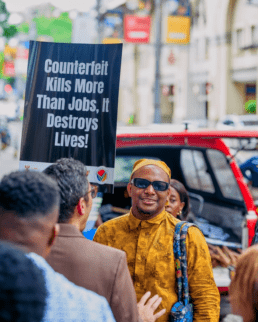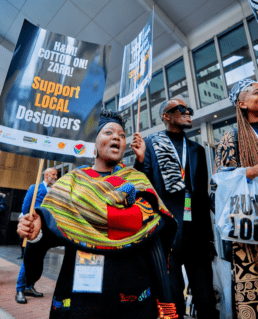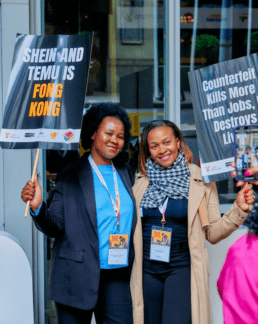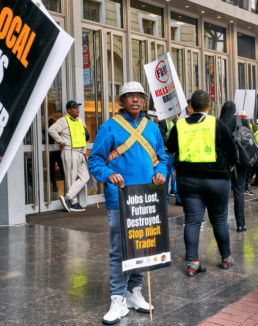TAKE A STAND MARCH – Enough is Enough!
During the Buy Local Summit on Monday, March 17th, some of South Africa’s most renowned luxury fashion designers took a bold stand against the flood of illegal counterfeit goods in the country. Led by @proudlySouthAfrica, icons like Palesa Mokubung, David Tlale, Craig Jacobs, Mzukisi Mbane, Londeka Buthelezi-Ndaba, LGBTQ+ activist Thami Dish and many more joined forces to demand government action, calling for stricter measures to protect the integrity of local fashion. This is more than a protest—it’s the first step toward economic emancipation for the African fashion movement!
Dressed in power, passion, and purpose, these designers are not just trendsetters—they are changemakers, fighting for authenticity and the future of South African fashion. Counterfeits, Ultra Fast Fashion brands steal from our creativity, our economy, and our people. It’s time for change! A clear message that can no longer be ignored.
This protest is a declaration: the African fashion movement is unstoppable and can no longer be overlooked. The global fashion industry must acknowledge that it cannot continue to profit at the expense of designers in African countries. Local industries in fashion hubs like Johannesburg are struggling under disadvantageous contracts, forcing them to close their businesses. Consumers must wake up and appreciate “Made in Africa.”
However, for many South African consumers, buying local remains a challenge due to high costs. The middle class is defined differently by various institutions, but according to the Bureau for Economic Research (BER), households earning between R5,000 and R20,000 per month are considered middle-income. businesstech.co.za
The University of Cape Town’s Liberty Institute of Strategic Marketing suggests that an individual or household would need around R22,000 per month to be classified as middle class. IOL | News that Connects South Africans
With this amount R22,000, equating to approximately €1,114.74 (as of March 20, 2025), the dilemma becomes clear: local products are more expensive than imported goods from China, the USA, or Europe. Furthermore, second-hand markets are also undercutting local businesses.
Where does this global challenge leave Western consumers? What stance should the Diaspora take to foster economic emancipation for designers? What solutions—governmental, economic, and social—are needed to dismantle these imbalanced power structures?
Enough is Enough! A dynamic and vibrant fashion scene is demanding its rights and making a stand. The question now is: What are the long-term consequences, and how can we bridge the gaps in economic responsibility and solidarity-based trade?
South Africa’s imports of clothing and textiles have surged in recent years. In 2024, the country imported textiles valued at approximately R65.5 billion (around $3.55 billion), marking a 10% increase from the previous year. This trend reflects both rising domestic demand and challenges within local manufacturing. China remains the leading supplier, with imports from China reaching approximately $1.6 billion in 2021. Other notable suppliers include Eswatini, Lesotho, India, and Mauritius.
The reliance on imports highlights the urgent need for local production to meet domestic demand, especially considering import duties of up to 40% on fabrics and clothing. This presents an opportunity for investment in South Africa’s clothing and textile manufacturing sectors, which can reduce dependency on imports and create jobs. Over time, job creation will lower production costs for designers and make local fashion more affordable for consumers.
To build an ecosystem that benefits designers and local producers, a holistic, community-driven approach is needed. Establishing strong, complementary links across the textile sector—from raw material sourcing to final consumption—will add local value and create sustainable jobs. It is time for solutions that actively promote economic and social inclusion.
“Today is the first step in asking the government to work with us. We want the community at large to stand with us. More than anything else, we are proudly South African, and we have what it takes,” stated designer David Tlale.
The movement is gaining momentum. The real question is: Will the world acknowledge Africa’s creative sovereignty and take meaningful action, or will it continue to exploit and undermine its artistic and economic potential?
Stylish frontline of protesters
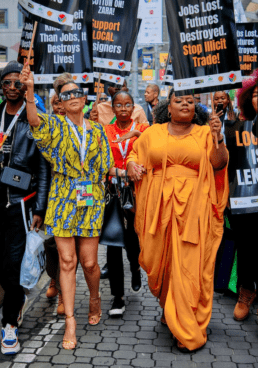
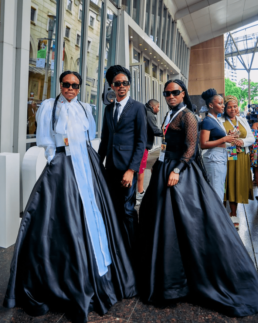
Buy Local Sumit
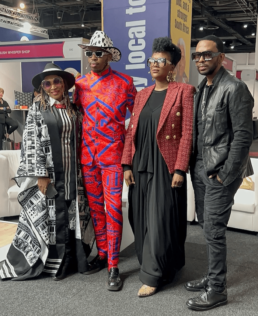
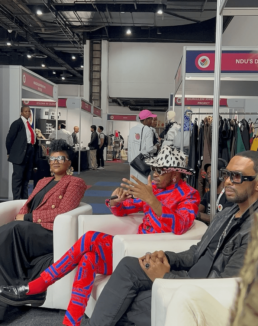
Images @nnombusokumalo @proudly.sa
Read more on Fashion Africa Now.
